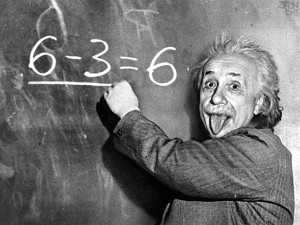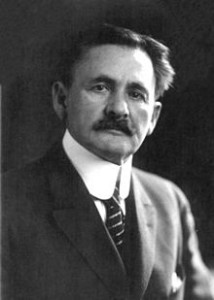Picktures and Pieces 10
General Relativity: A Silly Theory
Randall Auxier
 I have been greatly relieved to see someone finally exposed the whole sordid tale of Einstein’s quest for stardom and immortality in a thorough and honest way. Jimena Canales recent book, The Philosopher and the Physicist does what has long been needed. I have become weary over the years trying to explain to students, colleagues, fellow bar patrons, and a few domestic animals (especially my own cats) why they have been fed an ideology about Einstein and his supposed “genius.” At best he set physics back by fifty years with his machinations, and at worst he set the public back a century or more (since only now is the public beginning slowly to grasp they were sold a bill of goods). Einstein’s machinations drove a wedge between science and philosophy that was unnecessary and profoundly unscientific. The desire to “stay relevant” to science then drove wedges between and among philosophers and ruined the philosophy profession. Those philosophers who weren’t willing to make a religion out of science found themselves bounced from the bar where the scientistic set has its parties. So they built their own bars and now each group gossips about the other group like teenage street gangs warring over a few blocks of turf. Nearly all of it was caused by that silly theory. Let me give you the “short” of it –much of what I say is in Canales’ book, but this is my version of it.
I have been greatly relieved to see someone finally exposed the whole sordid tale of Einstein’s quest for stardom and immortality in a thorough and honest way. Jimena Canales recent book, The Philosopher and the Physicist does what has long been needed. I have become weary over the years trying to explain to students, colleagues, fellow bar patrons, and a few domestic animals (especially my own cats) why they have been fed an ideology about Einstein and his supposed “genius.” At best he set physics back by fifty years with his machinations, and at worst he set the public back a century or more (since only now is the public beginning slowly to grasp they were sold a bill of goods). Einstein’s machinations drove a wedge between science and philosophy that was unnecessary and profoundly unscientific. The desire to “stay relevant” to science then drove wedges between and among philosophers and ruined the philosophy profession. Those philosophers who weren’t willing to make a religion out of science found themselves bounced from the bar where the scientistic set has its parties. So they built their own bars and now each group gossips about the other group like teenage street gangs warring over a few blocks of turf. Nearly all of it was caused by that silly theory. Let me give you the “short” of it –much of what I say is in Canales’ book, but this is my version of it.
Einstein’s theory as silly because it gleefully denies our most basic experiences of time. General relativity asserts that time is one all-pervasive effect of gravity and that our experience of time’s “passage” is, from the universal point of view, illusory. I am willing to entertain the idea that this claim is coherent (that it can be made to hang together with a collection of tightly knit other ideas, all contained within a closed mathematical circle), but Einstein hasn’t shown any such thing. On this score, it will be good to look at Ohanian’s book, Einstein’s Mistakes, to get an idea of what I’m talking about (use the “Look Inside” function by clicking on the picture of the book and scroll down to the chronological list of major mistakes, many of them mathematical).People don’t seem to realize that Einstein was not a physicist. He was a mathematician. These are not the same sort of beast. One looks for its food in the physical universe. The other feeds on ideas, possibilities, and often cannot distinguish these from the world, and does not care to.

This is meter bar number 27,the US copy, which was the physical standard for the meter during Einstein’s lifetime.
The idea of General relativity is interesting, but it isn’t a scientific idea. It couldn’t be proven true or falsified. It’s a piece of theology. There can be no measurement standard that could prove or disprove it. All physical standards (from yardsticks to decaying isotopes) would be altered by even the slightest change in gravitational influence. The same meter stick in my hand is a slightly different meter in yours, given my relative bulk and your lack thereof (or vice-versa if you possess greater mass, but please do include my massive ego in your measurements, if you consider it real). If there is no standard (even the speed of light is affected by gravity, according to the theory), then no uniform measurement of gravitational influence is possible. Mass (the m in Einstein’s equation) becomes an arbitrary number due to our inability to fill in any empirical number, for lack of a unit of measure. In order for the theory to be true of the world, it has to be possible to measure mass in a uniform way. That meter stick won’t do it. And measuring mass is thus made impossible by the theory itself. So, even if the speed of light were really constant (and it isn’t, as Einstein knew), we still lack a non-arbitrary value for the m in E=m to be multiplied by the square of the speed of light. This is called the “measurement problem of cosmology” and the first book to look at first is Ken Alder’s The Measure of All Things, which recounts how the problem got started, in the initial effort to define the meter.
A hundred years later, Albert Michelson was trying to solve that problem of “the platinum meter” when he experimented with the speed of light. He failed. The speed of light is not shown to be constant. The reason was, at bottom, the lack of a reliable meter. The definition of the meter has been through a number of abusive relationships. Since 1983 the definition has been the one given here on the federal government’s website. Note, that the meter is now defined by the speed of light in a vacuum. IN A VACUUM, people. You know, that thing that both nature and Wikipedia abhor? That is, a meter is an idealized constant, not an empirical constant, and the way they finally “solved” the measurement problem was not by finding a standard for the meter in nature, but by abstracting from nature and treating as constant something that never actually occurs, then agreeing on that number (which is a guess, but we just all agree to accept the best guess as a standard) and then defining the meter (the actual meter in the empirical world) in terms of that number.

This is a giant lambda, which is how we denote the cosmological constant. I made it giant because one expects such an important thing to be something very big. Or perhaps very small. It’s hard to tell, since it can only be defined as energy in a vacuum (which is the opposite of energy, since nothing initiates change or does work in that situation).
This is not physics, it’s commerce and politics. The meter, so defined, does have to “work” for predicting where things will be and when, but I don’t believe Einstein’s theory was intended to be merely an approximation, close enough for travel and commerce and for landing one’s bombs where they can do the most damage. It was supposed to be the truth about the actual universe. Einstein knew he needed a cosmological constant, and he spent his last decades trying to frame one mathematically. He failed. He probably had to fail. He set the terms of his search in such a way that only a purely mathematical solution would do the trick, and almost no one cared about that goal, in his terms, since his search for such a constant was internal to his own mathematical assumptions, and no one else’s. Even if he found it, it would still just be a number that fit the artificial conditions of his theoretical framework, which is more theological than physical. Einstein was a poor philosopher and a terrible theologian. If you want a good version of these ideas, just read Spinoza, Einstein’s hero.
The quantum physicists are the ones who have been pursuing a better empirical understanding of the actual universe, and the further they get, the sillier general relativity looks. It appears that energy and its interactions can be nonlocal. No, let me be clearer. Energy just is nonlocal. That would be the “E” in the famous equation. This is impossible on Einstein’s theory. In clearer language, the quantum physicists have shown that energy is not just local mass, nor can it be defined or measured relative to some local effects of gravity (however we measure that —and good luck with it). Energy is no respecter of “space.” It doesn’t give a tinker’s damn “where” you are. But the “when” still makes a difference, as far as we can tell. For example, entanglement is a temporal relation that defies subsequent spatial relations (if they are understood as simple space-time locations), and that is only the beginning of the irrelevancies of space.
Now I will speak for myself and for the philosophers of physics I study, as I interpret them (Bergson, Cassirer, Whitehead): Space is apparently created by time, by the variable ways that time can be slowed, and space is created in millions of different modalities. There are, evidently, lots of different kinds of order in what we call “time.” The “space” of your ideas is just as “real” as the physical space you traverse in getting a drink of water. Both require that temporal passage occurs so as to construct the kind of “order” these spaces require, and that is many kinds, perhaps even non-overlapping. (That is, we don’t know whether the universa has to be logically self-consistent as to “order.”) Whether all the “orders” we could call “space” are of the one universal type, I don’t know, but Gary Herstein and I are theorizing (and trying to show in recent writings) that the space of possibility “includes” (in a technical, operational sense we define formally) ALL the spaces of actuality, and that includes all mental spaces, all virtual spaces, all symbolic spaces, all physical spaces, even moral space, if there is such a thing. (I have a different paper arguing that moral space truly exists, i.e., isn’t of supernatural origin as a form of order in the universe, but alas, that paper is not yet published.) This is not just the idea of possibility, it is possibility taken as radically empirical. Possibility also exists, which is another thing general relativity must deny. It is a deterministic theory, more suitable for 18th century Presbyterians than for science..

But does this problem make Einstein’s theory silly? It does. Einstein lived at the same time as Whitehead but would not have been capable of understanding Whitehead’s philosophical work. He wasn’t very good at grasping Spinoza, and believe me, Whitehead is tougher. Einstein could understand the mathematical work of Whitehead, but he rejected it because it showed that general relativity was no big deal as a mathematical model, and certainly was not a physical theory. Einstein had mistaken the principle he was interested in (relativity) for a single mathematical application of that principle. My co-author and collaborator, Gary Herstein, wrote a fine book on this in 2006. I hold Einstein accountable for willfully ignoring good arguments, definitive ones, which led to results he didn’t like for personal rather than scientific reasons. That is a bad, silly scientist, no? Rejecting what doesn’t serve your personal agenda, regardless of its cogency, rigor, and empirical weight? Yes, it’s a silly theory.


